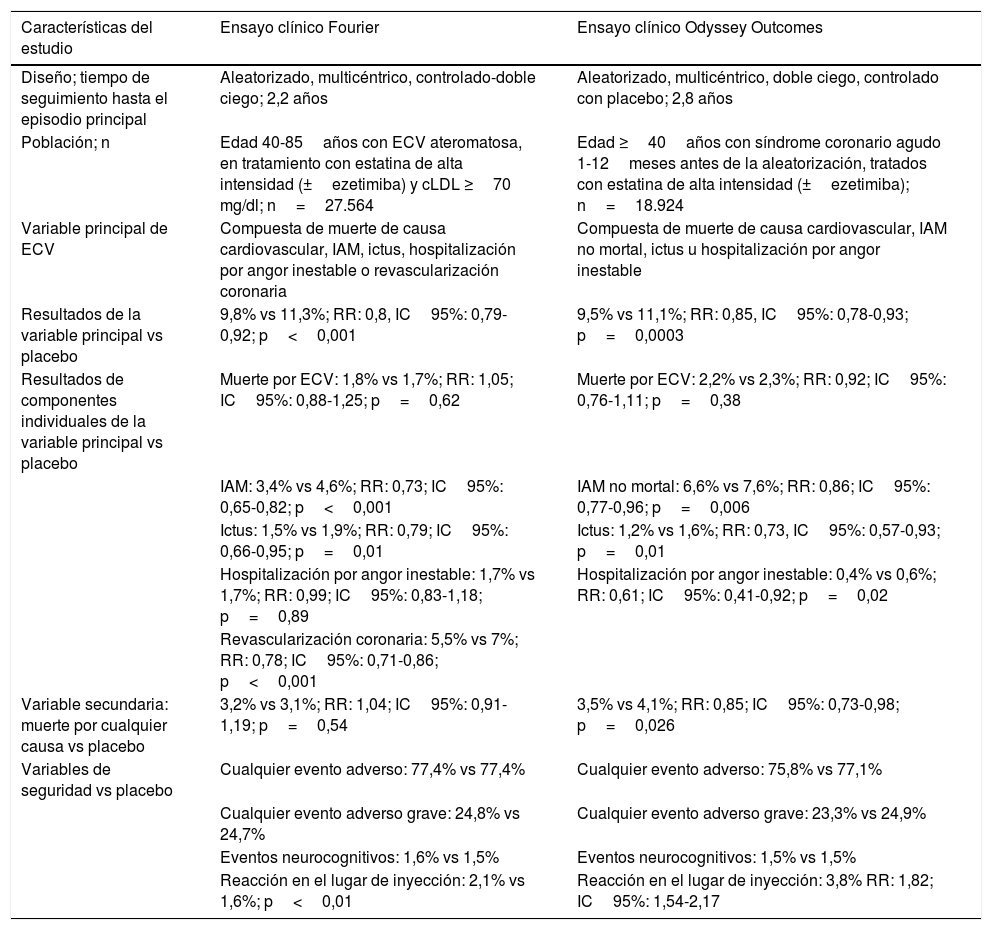Los grandes ensayos clínicos de prevención cardiovascular han demostrado que cuanto más se disminuye el colesterol aterogénico, mayor es el beneficio preventivo, sin que se haya observado un valor umbral por debajo del cual desparezca dicho efecto o se observen efectos negativos para la salud. Por ello, los objetivos de control de la hipercolesterolemia en los pacientes de alto riesgo cardiovascular son cada vez más estrictos. El hecho de que la mayoría de pacientes de alto riesgo no alcancen dichos objetivos hace necesario, entre otras medidas, un uso racional de los fármacos hipolipemiantes disponibles, incluyendo los anticuerpos monoclonales inhibidores de la proteína PCSK9 (iPCSK9). Los iPCSK9 actualmente autorizados para uso clínico, evolocumab y alirocumab, han demostrado una alta potencia para disminuir el colesterolLDL, que puede superar el 60%, y otros efectos favorables sobre el perfil lipídico, incluyendo una disminución también muy acusada del colesterol-noHDL y de la apolipoproteínaB. Así mismo, mediante ensayos clínicos a gran escala ambos fármacos han demostrado un efecto preventivo frente a las enfermedades cardiovasculares y un alto grado de seguridad. Además, en el caso del alirocumab se ha observado una disminución de la mortalidad por todas las causas. Sin embargo, el elevado coste de los iPCSK9 hace necesario ceñir sus indicaciones a los pacientes de mayor riesgo cardiovascular que no puedan controlarse con estatinas de alta potencia y ezetimiba. Es de esperar que las nuevas guías que serán emitidas en un futuro cercano por distintas sociedades científicas definan con mayor detalle en qué pacientes y en qué condiciones pueden utilizarse los iPCSK9, unos agentes que en este momento constituyen el avance más importante de la terapia hipocolesterolemiante de las últimas décadas.
The large clinical trials on cardiovascular prevention have demonstrated that the more atherogenic cholesterol is reduced the greater the preventive benefit, and neither a threshold value below which that effect disappears nor negative effects on health have been observed. Therefore, the objectives of hypercholesterolaemia control in patients at high cardiovascular risk are becoming ever stricter. The fact that most high-risk patients do not achieve these objectives requires, among other measures, rational use of available lipid-lowering drugs, including monoclonal antibodies that inhibit the protein PCSK9 (PCSK9i). The PCSK9i that are currently licensed for clinical use, evolocumab and alirocumab, have shown high potency in lowering LDL-cholesterol, which can exceed 60%, and other favourable effects on lipid profiles, including a very marked reduction of non-HDL cholesterol and apolipoproteinB. Likewise, through large-scale clinical trials, both drugs have demonstrated a preventive effect against cardiovascular diseases, and a high degree of safety. In addition, in the case of alirocumab, a reduction in all-cause mortality has been observed. However, the high cost of the PCSK9i means that prescription is restricted to patients at highest cardiovascular risk who cannot be controlled with high-potency statins and ezetimibe. It is to be hoped that the new guidelines that are to be issued soon by various scientific societies will define in greater detail the patients and the conditions in which we can use PCSK9i, drugs which currently constitute the greatest advance in hypercholesterolaemia of recent decades.









